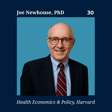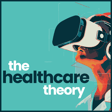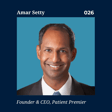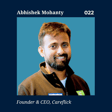Become a Creator today!Start creating today - Share your story with the world!
Start for free
00:00:00
00:00:01

The Power of Partner-Led Growth | Flagler Health CEO Albert Katz
This episode, we sit down with Albert Katz, founder and CEO of Flagler Health, a startup revolutionizing musculoskeletal (MSK) care.
With an operating system designed specifically for MSK providers, Flagler uses AI-powered triage tools to reduce readmissions, optimize patient care, and boost clinic efficiency—all while navigating the complexities of the healthcare ecosystem. Albert shares his unexpected journey into healthcare, the tough realities of building a startup, and the challenges of working with physician workflows. He dives into how Flagler partners with medtech giants, differentiates itself from virtual PT players like Hinge Health and Sword Health, and builds sticky, value-driven solutions that clinicians actually use.
Transcript
Introduction to the Healthcare Theory Podcast
00:00:00
Speaker
Welcome to the Healthcare Theory Podcast. I'm your host, Nikhil Reddy, and every week we interview the entrepreneurs and thought leaders behind the future of healthcare care to see what's gone wrong with our system and how we can fix it.
00:00:15
Speaker
On today's episode, we're speaking with Albert Katz, who's the founder and CEO of Flagler Health. Flagler Health is a company and that's using AI to lower readmission rates, improve the quality of care
Albert Katz's Journey into Healthcare
00:00:25
Speaker
for providers. So thank you so much, Albert, for coming on today. I'm super excited to have you.
00:00:30
Speaker
Thank you. Thank you for having me. Of course. And before we get into like what your company is actually doing, we'd love to get into your background. Um, just like simply like what brought you to healthcare and entrepreneurship? Oh, that it's, it's been a complete accident.
00:00:46
Speaker
Um, I typically wanted to just be a programmer. um and then I switched my mind again, wanted to go into finance, sell my soul to investment banking. Um, but the way I found myself in healthcare care was essentially, I had to move back to Miami. I was living in Boston at the time and I couldn't really find a job in Miami.
00:01:10
Speaker
Um, especially at like the ripe old age of 23 and somehow by the grace of God, some headhunter calls me up and he's like, Hey, have, I have this position for you. um it's for a like director of finance role at a healthcare clinic.
00:01:25
Speaker
And, um, He's like, do you wanna apply? i'm like, sure. So I go into this room and there's like this 40 year old who was a med tech rep at Medtronic, a 27 year old who graduated Duke law.
Challenges and Innovations in Healthcare Management
00:01:40
Speaker
And then there was me. And somehow i i dress i i wore my only like dress shirt and glasses and I got the job. And that was my first in into healthcare. i ran that I ran that like MSK clinic from 23 to 27 we grew it um around 17 employees to 120 in that time got a bunch of offers from private equity and then i left to go get my mba at wharton and i decided of all majors i'll i'll focus on health care management and from there it's kind of just like once you're in health care and you kind of understand the intricacies it's
00:02:21
Speaker
it's so cognitively interesting, you know, like it's different and you have to apply basic principles, but like to this very weird structure that's ever changing. So that's it. Yeah. And before you, I mean, got to add your and MBA, like what was that process like being able to like scale, scale up that clinic? Cause I know it's like super hard to not only like, not only able to like expand your practices, like get providers, the whole host of different issues.
00:02:44
Speaker
um Like what were the problems and challenges there that kind of um realized like entrepreneurship, entrepreneurship is something that you want to pursue. Yeah, so I would say many, many challenges. The the first part is like understanding that there are a lot of problems that you could easily solve, but litigation basically prevents you from doing them.
00:03:09
Speaker
Like specific incentives that could help patients, but because of you know laws that were put into place, um such as HIPAA, Stark, anti-kickback, which are put in for a very good reason, um they, because they're so overarching, also prevent you from ah potentially funneling and triaging patients appropriately.
00:03:30
Speaker
um The other issue I've noticed, and and this might not be a popular opinion, is it is quite hard as an administrator to work with ah physician egos. So that has ah that has certainly been one of the hardest learnings I've had, that even if something is optimal or even if there is the right decision to make, um it is hard to change a physician's workflow.
00:03:55
Speaker
um especially if in any way, shape, or form, they feel like they're ah losing power. um So, yeah. Those have stuck in my head.
00:04:07
Speaker
Yeah, I think that's like a huge... problem we've seen like healthcare private equity is that like when trying to scale up, it's difficult to do so because like the providers are the business and then now they're losing that grip where they're having some other operator come in and they still want some like
Flagler Health's Strategies and Goals
00:04:20
Speaker
profit sharing. So there's always that host of issues that are difficult, but specifics like MSK care, were there any specific problems in the physical therapy realm and things with MSK that were unique in that scenario or what was that experience like? I can imagine there was plenty of inefficiencies, so love to hear them.
00:04:36
Speaker
Yeah. I mean, the practice first started off as interventional pain and then it moved into like the the whole breadth of it of, or interventional pain, ortho and PT. But when we were in interventional pain, the the difference in the patient base, which is, I guess, is that what you're asking?
00:04:52
Speaker
Yeah, I guess I'm more, yeah, more high level like that. yeah exactly. Yeah, the the patient base is a lot more chronic, so they're more reoccurring. um But yeah, I guess that would be the main differentiator. The other thing that I found interesting about it was, um you know, at this pace right now, MedTech innovation has really taken off.
00:05:16
Speaker
And if anything, it's outpacing the education system, specifically in residency and and fellowship for the pain program. And so now we're getting, i feel like that program is inching closer and closer and to overtaking some of the procedures that orthopods are doing.
00:05:33
Speaker
And they're able to do it with, less like less cost and less complication. um i think the closest comparison to that would be the cardiac stent. So like you know like back in the 70s, 80s, you'd have to do open heart surgery.
00:05:47
Speaker
Now you can essentially just install a stent and you'd get it done for like a couple thousand dollars and it would be like a five minute procedure with very few complications. That makes sense. Yeah. And I can see like there's clearly lot of white space in this area. There's a lot of things that need to be solved. And of course, like an MBA gives you that like inflection point to kind of start something on your own, like raise capital for it. But i mean, can you give us elevator pitch on Flagler Health? Like where do you guys come in? what are you trying to solve? And we'd love to hear what you're trying to do with with that platform.
00:06:18
Speaker
Yeah. So essentially we're just an operating system for MSK. um And our marquee product has been the triage slash recommendation tool where essentially we can identify whether a patient is high risk low risk and triage them to appropriate provider so take like a doctor or a nurse practitioner so by then you're somewhat benefiting both angles of the of the system whether it's fee-for-service or value-based care fee-for-service because you're maximizing revenue per visit
00:06:52
Speaker
And then um value-based care, because all of the high-risk patients are being treated by the provider that is most likely able to best treat that patient. So like you're not incurring additional costs through like hospital readmissions and so on and so forth.
00:07:07
Speaker
um um Through the operating system, once you have triage down, and you are able to identify which patient needs what you can then stack on any other product so think of like these um point solutions so like you have scribes right like ah like ai scribing you have like rcm companies um you have prior auth companies and ah these companies are all in the health tech space
00:07:39
Speaker
kind of creating like horizontal solutions or like they just get really good at this one thing and then they try to sell them to every specialty in every health system and we decided to kind of take the opposite approach we're like okay let's go into msk let's create the stickiest product possible and then let's just upsell from there into only msk right this msk is like this massive space so but Our main idea is once we get into a large number of accounts, which we've gotten through with these med tech partnerships, um we'll start basically looking at other products that we think could best suit our clinics or health systems, and then copy their tech and sell it ah within our operating system.
Flagler's Differentiation in the MedTech Space
00:08:27
Speaker
And if not copy, then most certainly partner with. So for example, for revenue cycle management, that's an entire company to copy and we're only a series A, like that's never gonna be on the roadmap.
00:08:38
Speaker
So we just partnered with a quite large or one of the larger RCM companies in the nation and everyone that we offer our RCM services to, um they basically white label under um a Flagler solution.
00:08:55
Speaker
Does that make sense? Yeah, that helps. That helps. That makes sense because of course like they the EHR, sorry, the RCM company gets like the same benefits. Like they still get some of the revenue. And of course for you guys who can offer more service, upsell from there.
00:09:08
Speaker
But I mean, I'm curious. I know like, you'll see more large in the industry, EHR companies will build like a digital front door, a sell to everyone from like large PE back, like psychiatry practices to small, like little clinics doing orthopedic, like dentistry. um But I was curious though, you were trying to build a solution that was very focused on building those like competitive mode, this product that's sticky. and So that's actually, which means it's really providing value if it's sticky. But like, what were the key things in your product that helped you really believe that it would be a sticky solution that providers would actually like, because there's essentially the way you guys are triaging, you're kind of reinventing the workflow for them. So yeah. or so comes
00:09:45
Speaker
So two things, one in terms of stickiness, it's like, okay, like you can build like a really good AI scribe, like a bridge, right? And of course that'll be sticky. But um the thing is, is if you build a really good scribe, you can't necessarily like build other products that are better because you have an AI scribe, right?
00:10:06
Speaker
But if you have triaging, you can build better products because you have triaging. So for example, um, imagine like something very ah popular that a lot of clinics have been adopting. It's like this thing called remote therapeutic monitoring or chronic care management, right?
00:10:22
Speaker
So any RTM CCM company would come into a clinic and they would try to you know offer RTM CCM services or like behavioral health services. And they basically just like, shotgun fire which patients are eligible for this or they rely on the doctor to find those patients, which like in their workflow, it's very hard for them to adopt this additional thing.
00:10:44
Speaker
With the recommendation tool, you don't really need that, right? Like you can just identify those patients directly because you have this tool that knows which patients are eligible for what, right?
00:10:55
Speaker
and so that same tool can be tweaked to like you know enhance prior auth to to proactively say which patients are more likely to need to check for prior auth than not right and this goes on so on and so forth with most other products that you would essentially want to bring on to the platform yeah and then i totally forgot what your second question was i remember this was the sticky one Yeah. um Yeah. But that makes a lot of sense, though. And no worries. That makes a lot of sense because i think that, like, of course, if you're able to provide a product that's triaging people each like new supplementally like upsell opportunity, so ideally like synergize with that beyond just like something or tacking onto the platform. So that's something great to hear. And out of curiosity, um like how have you been building these partnerships, though? Because, of course, like you guys are a new startup, kind of building an a name for yourselves. I've built like
00:11:46
Speaker
a lot of like med tech partnerships, like how'd you go about those in the beginning when you were first just building out your story Yeah, we got very, very lucky. um So the reason why we started the company is because we basically had a couple of med tech companies like Abbott and Boston Scientific that were interested in launching pilots with us.
00:12:06
Speaker
And those pilots led to other med tech companies being interested with us and then using their internal sales team for these like large billion dollar companies to essentially sell our product for us.
00:12:19
Speaker
So then we got into multiple sites throughout the country very, very quickly, got a hold of a lot of data. um And now, well, up until our series a have been acquiring clinics and health systems for zero CAC.
00:12:34
Speaker
Mostly clinics, just one health system. But now, now, now three health systems. But yeah, so... um um, that's kind of been like the, the flywheel effect, right?
00:12:45
Speaker
That's kind of what's helped us grow very, very quickly. And now, um, as we continue to grow out and and we're actually hiring, well, we hired a salesperson where we're thinking like, okay, like how can we grow within our accounts to like maximize the amount of money we make?
00:13:01
Speaker
Yeah. And how, um, I guess like out of curiosity, and before we kind of get into like your growth strategy and how you're pursuing like growth in the future, but mean, how are you kind of viewing the guys in the competitive landscape? because i know you'll see like these like Sword Health and Hinge Health, you've heard of them, like addressing MSK, like much further upmarket with like employee benefit solutions.
The Future of Virtual MSK Care
00:13:19
Speaker
They're using like AI to um and ensure that like MSK is like using AI to like, I guess, address MSK in a very different way than you guys. Like they're um doing that through like the benefit route. So getting employers to buy their solution so then they can reduce, um
00:13:35
Speaker
like, I guess adherence in that way. But like, of course, like for you guys, like what's your differentiating across this landscape? Like how crowded is it Oh, I see. How are you guys sending out? So Hinge and Sword are are doing like virtual PT through your phone, right? And they're doing through the employer base. So I think there's basically yeah multiple differentiators. I guess one in particular is they're kind of going top down and we're going bottomed up. So like they're working with like the payers or like the employer based payers, employer backed payers.
00:14:04
Speaker
which basically means like, imagine like Blue Cross Blue Shield comes to you and says like, hey, or like Google comes to you and says like, hey, like here's Hange or SORD, you could use it because um your back hurts, right?
00:14:16
Speaker
um You would take those recommendations a lot less seriously than if you went from the bottom up and you got that recommendation from your provider. So for us with the recommendation tool, we kind of reach out to the patients on behalf of providers and that allows them
00:14:34
Speaker
that allows them to basically feel like it's not a payer that's offering the solution, but it's really their own doctor, keeps them closer and produces higher engagement and enrollment, right?
00:14:45
Speaker
So I think if you were to look at like Hinge or S.W.O.R.D., last time I checked, their engagement was like around 7% per patient that's reached out, right? Like ours are our hovering around the 40s.
00:14:57
Speaker
So it's it's a very different approach. Now, on the other hand, though, like to there to to be fair to them, Like if you get into one major payer, that's millions of lives, right?
00:15:08
Speaker
For our MSOs, like the larger MSOs we're in it's maybe a hundred thousand lives a year but than ah that approach the clinic. So it's a different scale, but in terms of numbers um or stickiness, like our, our patients are more sticky.
00:15:24
Speaker
And so with more time, i think it'll be better. But also to the second point is like, we're offering very different solutions. Like, We aren't going for virtual physical therapy, right? Like we are essentially meant to be like the steroid for the front and back office of these health systems or clinics.
00:15:42
Speaker
And we just happen to focus on MSK because if you really want to build a really good point or a really ah good solution, you should focus in on one specialty because every specialty works differently.
00:15:54
Speaker
Mm-hmm. Yeah. And out of curiosity, I know that what you guys are able to do is essentially because there's a huge problem where like providers are spending probably more money than they'd like to. And of course, like they earn money off the spread between what the insurers are willing to pay. And that is put a lot of pressure on. So you guys are essentially saving money for providers, helping them earn more insurance, insurers that they can do they'll deliver high quality care for less but do you believe like in terms like like physical therapy msk moving to a more virtual segment do you think there is some like ah do you think it will ever dig digitize and like kind of what's warden hinge or envisioning do you think that'll be ah potential future or how are you kind of viewing that because of course like if i'm going to like need some sort of msk solution i'd rather see a real provider but yeah what's your thoughts on that debate i mean i think like
00:16:39
Speaker
For them, they're not going for everyone, right? like they're not They're not saying that you should see an orthopod virtually. they're saying like I think that's more something or along the lines of Bori Health. They're saying more like, hey, you could do PT virtually.
00:16:49
Speaker
And like if anything, you can replace them the PT with like this machine or this app. um I do think that eventually we'll get there. I think it's going to take a lot longer than most people predict, though, because like it's not so much a technological thing.
00:17:06
Speaker
issue ah right now. um It's more of like a societal issue. And it'll really, think for us, again, shot in the dark, I think it's going to be like 20, 30 years until at least half ah of society is comfortable with this. And it won't even be for like the most serious cases, right? Like if you tear ACL, you're probably gonna wanna see someone in person.
Integrating AI and EMR in Healthcare
00:17:29
Speaker
But if you're like 65 and you have like chronic hip pain and you just need to raise your leg a couple times both sides and make sure like you're hitting the right angle, yeah, you could do that over an iPhone.
00:17:42
Speaker
Yeah. It is very interesting because i think people still like a lot of hesitancies, like ah a bit off topic. But Zillow, for example, is trying to like move the entire home buying process online all through AI and then or like just technology. And that that didn't work because people would rather work with a real realtor when they're making the largest decision to ever make, which is buying a home.
00:17:59
Speaker
And for you, I mean, you're still you even down like you're still kind of changing the workflow providers, like showing them like. how hard is it to convince them that like ai is gonna be able to save them money? Cause of course they've have a system they've been working on for like decades and this patient on educating your customers is not an easy thing to do. Like what is your role in that? And how are you going about like that customer education and working with providers on that lens?
00:18:23
Speaker
Yeah, yeah. I was, one second. So two things. um I think firstly, like in the Zillow example, you're a hundred percent, right? Like buying a home is very expensive.
00:18:39
Speaker
Um, people find like, okay, that's like a multi-year decision, right? It's like one or two years of shopping and then you're going to live there for, don't know, 10 years to the rest of your life, whatever the timeline is.
00:18:49
Speaker
Um, and you would you would think like that's not something you can do online, somehow Tesla figured it out. you know like Tesla, you really only buy the cars online somehow. yeah I don't know.
00:19:00
Speaker
I don't know if it's it's an operational hurdle. Tesla, you know where you're getting exactly. because it's like they have The OEMs are super simple. simple like There's only so many combinations. yeah no I totally agree. i totally agree. But I'm also thinking like the majority of these... um Like I'm thinking of like back in like 2008 to 2012 when Teslas were just starting to take off. Like there weren't that many dealerships.
00:19:23
Speaker
You know, like you knew kind of, but like did you really? Like maybe you've stepped foot did you take a test drive? Did you look through like the entire, um I guess, iPad thing that's floating around there? But whatever, it doesn't matter.
00:19:35
Speaker
um yeah In terms of your question, I was like, okay, why would like... patients or providers adopt it, right? Like patients, it it doesn't really matter because we're not like directly ah impacting the patient, right?
00:19:47
Speaker
um But the provider, it's more like, think of like Google search within the EMR. Like we're not changing the workflow. We're not telling them to log into an additional program.
00:19:58
Speaker
It's just within their yeah EMR under the patient note or the visit type, we make our recommendations and the provider just needs to look glance at them and it's really meant to be more like a reminder.
00:20:12
Speaker
Like imagine like a sticky note that's just like on your on like a chart, for example, like the equivalent of, it says like, hey, you know you have 15 minutes with the with the patient, have you thought about also doing like a spinal spacer, giving them a back brace and then like also testing from urine drug screen because they're on some high level of opioids and it's been more than six months, you know?
00:20:34
Speaker
So that's all it is. It's not meant to like you know tell them exactly what to do, but it's also it's just meant to like remind them, like hey, this is what they're medically and most likely financially eligible for.
00:20:46
Speaker
like Their insurance will pay for it. Yeah. And more so, um and then like in terms of that, that definitely makes a lot of sense. Like you're providing a recommendation, but you're not only providing like creating constraints is no provider wants because they believe they have their own way of to doing things. But in terms of like selling the solution to providers and selling it to like the actual like operators behind these providers, like what is that? Like what is your like simple value prop? Like what story are you telling and how are you going about that sales process and achieving growth? Because it definitely is very different from what Sword and Hinge are trying to achieve, whether you're
00:21:19
Speaker
sounding like $50 million dollars contracts with a huge sales cycles. Yours is probably going to have a lot more variability and volatility as I can expect. But what's that story been like for you? Well, usually the med tech companies kind of introduce us first.
00:21:34
Speaker
And when they introduce us, the accounts already say yes or no. And when they say yes, then we're introduced and then we're coming in and we already know that there's already initial interest. So it's a bit of a different conversation for us, but, um,
00:21:50
Speaker
I would say that for us, the the main selling point is just like, hey, we have this recommendation tool um and it's we always speak to the CEO or we speak to like the CMO and we never blame it on them, but they both already know of this problem that's aware. So we always start the problem. The problem is like, hey, there is a lot of patients that are being recommended for treatments or overlooked for specific treatments.
00:22:17
Speaker
And you should really try, you should download the software because it'll help you keep up with them. And this in return will raise your revenue by x And so for providers, they kind of see like how much we charge They see the ROI is like 8x and we give them this ah kind of like almost risk free trial where they can back out after three months. So it's a one year contract. They can back out in three months. And then for us, like the most important thing was is not even generating revenue off of the recommendation tool, um but more so getting into as many sites as possible.
00:22:53
Speaker
Um, so that we essentially have the sticky product and then can benefit later through upselling potential or, um, or data aggregation.
Flagler Health's Future and Value-Based Care
00:23:04
Speaker
So it's more of like a long-term play, uh, than it is like immediate benefit for the company for revenue.
00:23:12
Speaker
That makes sense. And that's helpful. So, I mean, just kind of seeing where you guys are at right now, like you're a bit essentially, um, not completely trying to like disrupt the whole workflow for clinicians or trying to enable them to see more patients.
00:23:23
Speaker
work more efficiently and then selling through that through your partnerships. And like, where do you see Flagler Health going in the future? Like, what do you believe is going to be? I can imagine. new partnerships coming on board, you can get like maybe scribes and other like those traditional technologies partner with them. But like, what are you trying to build like internally and what's your um product roadmap and what's your, your vision there? i would love to hear it.
00:23:43
Speaker
Yeah. Yeah. So it's kind of three steps. um One is getting to as many MSK sites as possible in America. um Two is um start aggregating data, helping fee for service clinics and, um,
00:23:57
Speaker
essentially like improve their MIPS, um gather gather data that they weren't gathering before. So that's really through like the remote therapeutic monitoring, chronic care management angle. And then three, and this is like an eight to 10 year plan.
00:24:10
Speaker
Once you have all this data, um help them negotiate rates with payers to the point where then you Flagler can go to like whatever payer. So let's say like United and say, hey,
00:24:23
Speaker
um this clinic is willing to now finally take on a value-based care contract so long as like this is how we, this is what you offer. So let's say like $800 per patient per year for their entire patient base.
00:24:40
Speaker
And then we would go essentially to the clinic and we'd say, hey, like we calculated that you're going to probably spend $600 or make $600 per patient per year. So there's $200 Delta that United offering you. so there's a two hundred dollars delta that united is offering you um for being the arbiter of this contract and you implementing our negotiation, recommendation tool, we're going to take 10% of the upside.
00:25:02
Speaker
And so that kind of incentivizes these MSK providers to adopt value-based care, right? Because right now they really have no incentive and most of their incentives for practicing the way they practice are all ah financially driven.
00:25:17
Speaker
Mm-hmm. And what what is like, so they don't really have an incentive, but what the situation right now about their hesitancies to adopt like value-based care? Because of course that's been put in place for a while now. I think you definitely seem to be adopted a lot more in like psychiatry and other segments like that, a bit more than you would in MSK. But like specifically, what were the problems that you were seeing that prevented like providers or just kept them a little, like what was the hindrances that kept them from adopting value-based care?
00:25:43
Speaker
Yeah, they don't have the data. So it's like they're like shooting without a scope, right? Like they don't know exactly. what their net, like what, how much they're going to spend per patient per a year the following year.
00:25:58
Speaker
And the only way you can estimate that is like, if you have a essentially like this recommendation tool that can assess the risk of a patient and like take on this like linear progression um and, or account for the linear progressing disease like 12 months from now.
00:26:15
Speaker
And that's kind of what we've been working on this entire time. That makes sense. Yeah. Cause I guess like the whole idea is that like value-based care, you're trying to reduce the cost, but if you don't know like what the cost is going to be, like, and what you're functionally going to be earning over like what a value-based care providers or insurer insurer is going to pay you, like you're taking on a lot of risk. I can imagine that you're kind of companies solving for that risk. So that's really exciting. um And like, how do you view like what's and within like your partnership strategy and building that out and like,
00:26:44
Speaker
funding and things like that like where is that plan to your plan is that just like you find at an inflection point and like what is your belief in terms like venture capital and building those relationships oh do you mean um in terms of like fundraising like when when do you like when do you write what's your yeah um So we went to raise our first round in March of 2024, and then we raised our series A in December of 2024.
00:27:13
Speaker
um And now, i mean, the way that the company's operating, I guess, we're pretty lean. So we may not have to raise again, and if we do,
00:27:25
Speaker
um It'll probably be for like some really, really big explosive growth opportunity. um But I guess the the beauty of, or the luck that we we've received throughout like the past two years has really just been, has ah has enabled us to do a lot with requiring very, very little.
00:27:45
Speaker
And really, really thankful for like the massive innovation in AI for these past two years, because everything we're building now is just a lot more fast. It's a lot faster. It's a lot more, it's a lot cheaper.
00:27:58
Speaker
And, you know, what usually would require like a team of 20 engineers you can do with like 12 or 13. Yeah, I think, it's I mean, it's faster cheaper, but also to think that people are more willing to adopt it. You've told a provider, like you should use AI to actually kind of know what that means. If you told them like three or four years ago, they'd probably be confused on where that kind of fits into their that piece of the puzzle. So I can definitely imagine how like this whole trend is helping out in terms of your operations. And final question, like what what's your, do and turn I know your journey is like definitely spend a few areas, started in banking, went to more like a private equity back for before private equity, but like an operating company. And then of course, now you're building an operating system. Like what's your advice for like kind of entrepreneurs that are willing and looking to do the same thing?
The Entrepreneurship Experience
00:28:41
Speaker
Oh yeah, it sucks. Don't do it. ah Yeah. Yeah. I, uh, I didn't know it was going to be, like everyone tells you it's going to be time consuming. It's going to rough, but you don't really understand it.
00:28:54
Speaker
And then until you're in it. And then, um, I guess the only real advice that I could give you outside of like, just be sure you really, really want to do it before you do it is, um, I don't know, maybe unless you're like some crazy rocket ship for us, it's,
00:29:10
Speaker
it's like a roller coaster and you have, and it could be, ah the roller coaster could be, or the ups and downs in between the intervals could be as short as like two days and as long as like two months.
00:29:24
Speaker
And you'll be riding really high where you think like, oh my God, this is going to explode. um Or you could be like at the bottom of the pit where you're like, oh crap, like we're going to die in a couple months.
00:29:36
Speaker
So it is an emotional roller coaster. It's a little addicting. And I would say that... whatever you end up building, just be ready for that experience, regardless of what it is.
00:29:50
Speaker
And I guess the last thing, and this is probably what you'll just see on Y Combinator, it's just like, make sure you talk to your customers and really see if they want to buy what you're building and before you build it.
00:30:01
Speaker
Like yeah we spent two weeks on building this like one ah i guess feature add-on and then we kind of realized that like okay like 60 of our customers already have this and they do it for free so why would they pay us like 15 bucks a month for 15 bucks per patient per month to to offer it and we're like okay those two weeks could have gone to like some product that none of our pay none of our uh customers have so that was just mistake i made myself Yeah, I think your problem based innovation, like kind of the answer it's it's, but it's like hard to do with, especially as an entrepreneur where you have like this vision in mind, it's easy to kind of skip that step and just completely go to doing things. But yeah, i totally understand how hard it is to kind of do entrepreneurship. And I think that's a lot of things that you have to be willing to ride those waves. It's not going to be the same thing every day. Like it would have been at
Conclusion and Call to Action
00:30:48
Speaker
a larger company. So thank you so much, Albert though, for walking us through your solution, like how you built this problem problem and are scaling it now. It was super exciting to hear your story and what you guys are working on today.
00:30:59
Speaker
Ah, my friend, thank you. ya.
00:31:04
Speaker
Thanks for listening to The Healthcare Theory. Every Tuesday, expect a new episode on the platform of your choice. You can find us on Spotify, Apple Music, YouTube, any streaming platform you can imagine.
00:31:15
Speaker
We'll also be posting more short-form educational content on Instagram and TikTok. And if you really want to learn more about what's gone wrong with healthcare care and how you can help, check out our blog at thehealthcaretheory.org. Repeat, thehealthcaretheory.org. Again, i appreciate you tuning in and I hope to see you again soon.



















